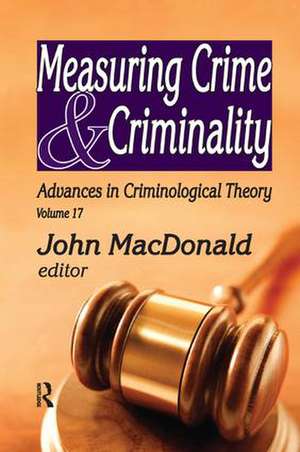Measuring Crime and Criminality: Advances in Criminological Theory
Editat de John MacDonalden Limba Engleză Paperback – 6 oct 2017
Din seria Advances in Criminological Theory
-
 Preț: 327.48 lei
Preț: 327.48 lei -
 Preț: 337.22 lei
Preț: 337.22 lei -
 Preț: 432.29 lei
Preț: 432.29 lei -
 Preț: 389.38 lei
Preț: 389.38 lei -
 Preț: 416.82 lei
Preț: 416.82 lei -
 Preț: 395.04 lei
Preț: 395.04 lei -
 Preț: 489.26 lei
Preț: 489.26 lei - 14%
 Preț: 299.52 lei
Preț: 299.52 lei - 15%
 Preț: 297.57 lei
Preț: 297.57 lei -
 Preț: 375.54 lei
Preț: 375.54 lei -
 Preț: 391.22 lei
Preț: 391.22 lei - 13%
 Preț: 351.24 lei
Preț: 351.24 lei -
 Preț: 349.10 lei
Preț: 349.10 lei -
 Preț: 416.22 lei
Preț: 416.22 lei -
 Preț: 449.63 lei
Preț: 449.63 lei -
 Preț: 393.52 lei
Preț: 393.52 lei -
 Preț: 444.80 lei
Preț: 444.80 lei - 18%
 Preț: 999.51 lei
Preț: 999.51 lei - 16%
 Preț: 260.54 lei
Preț: 260.54 lei - 16%
 Preț: 262.73 lei
Preț: 262.73 lei -
 Preț: 342.70 lei
Preț: 342.70 lei -
 Preț: 441.91 lei
Preț: 441.91 lei -
 Preț: 395.37 lei
Preț: 395.37 lei -
 Preț: 426.46 lei
Preț: 426.46 lei -
 Preț: 353.62 lei
Preț: 353.62 lei -
 Preț: 389.66 lei
Preț: 389.66 lei - 30%
 Preț: 769.59 lei
Preț: 769.59 lei
Preț: 299.52 lei
Preț vechi: 349.10 lei
-14% Nou
Puncte Express: 449
Preț estimativ în valută:
57.32€ • 59.62$ • 47.32£
57.32€ • 59.62$ • 47.32£
Carte tipărită la comandă
Livrare economică 14-28 aprilie
Preluare comenzi: 021 569.72.76
Specificații
ISBN-13: 9781138511965
ISBN-10: 113851196X
Pagini: 403
Dimensiuni: 152 x 229 x 30 mm
Greutate: 0.45 kg
Ediția:1
Editura: Taylor & Francis
Colecția Routledge
Seria Advances in Criminological Theory
Locul publicării:Oxford, United Kingdom
ISBN-10: 113851196X
Pagini: 403
Dimensiuni: 152 x 229 x 30 mm
Greutate: 0.45 kg
Ediția:1
Editura: Taylor & Francis
Colecția Routledge
Seria Advances in Criminological Theory
Locul publicării:Oxford, United Kingdom
Cuprins
Introduction: The Measurement of Crime and Estimating Treatment Effects in Criminology, 1. The Self-Report Method and the Development of Criminological Theory, 2. Socially Desirable Response Bias in Criminology: An Example of Its Effect in Testing the Effects of Self-Control, 3. How Do We Measure the Severity of Crimes? New Estimates of the Cost of Criminal Victimization, 4. Communities and Crime Theories: Construct Validation Deficits, a Paucity of Comparisons, and a Boudon–Coleman Metamodel Resolution, 5. The Coming of a Networked Criminology?, 6. What Can Genetically Informed Research Tell Us about the Causes of Crime?, 7. Bounding Disagreements about Treatment Effects with an Application to Criminology, 8. Randomized Experiments and the Advancement of Criminological Theory, 9. Causal Inference via Natural Experiments and Instrumental Variables: The Effect of “Knifing Off” from the Past, 10. Criminal Career Research: A Statistical and Substantive Comparison of Growth Modeling Approaches, 11. Understanding Desistance: Theory Testing with Formal Empirical Models, 12. Meta-Analysis and the Relative Support for Various Criminological Theories, Contributors, Index
Descriere
Measuring Crime and Criminality focuses on how different approaches to measuring crime and criminality are used to test existing criminological theories
